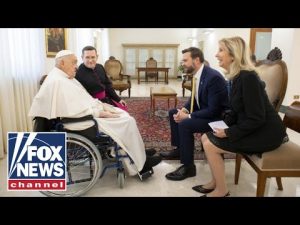Oh, the art of deal-making—it seems to be Donald Trump’s bread and butter, and yet again the former President appears to be rolling up his sleeves ready to tackle the big boys on the global stage. This time, it’s China and Europe in his crosshairs, with talk centering around trade deals, tariffs, and ensuring that our markets are no longer treated like the world’s bargain basement. Ambassador Matt Whitaker, the United States’ Representative to NATO, chimed in with some insights on this grand theater of trade drama.
Whitaker sees China’s advantage as a troubling $300 billion trade deficit America suffers with them. It is as if Trump is tightening his cowboy hat and announcing to the world that this rodeo has to change. Europe too joins the party with a $250 billion contribution to the growing trade imbalance. It’s almost as if these counties have been enjoying the equivalent of all-you-can-eat American trade buffets while conveniently leaving our goods out in the cold. American farm commodities and manufactured products are left on the dusty shelves while they sell their stuff here without a hitch. Seems fair, right?
Trump’s tactics come across like the parent putting their foot down after the kids have run rampant through the cookie jar. The message is clear: it’s time for a seat at the table. China, ever reliant on exporting galore, finds itself in a precarious position. The threat of getting crushed has the Chinese ready to deal, which shouldn’t surprise anyone. It’s in these moments when Trump channels his reality TV instincts, promising that great deals for the American people are about to unfurl—after all, this was one of the cornerstones that put him in the White House in the first place.
And what’s the latest scoop from Europe? Apparently, they too are feeling the pressure. Prime Minister Meloni of Italy was sent to represent European interests. Representing the European Union, Meloni must contend with Trump’s demands: “Buy American, or the tariffs stick.” With a $250 billion yearly trade deficit, Europe needs to start playing fair by taking down things like their value-added tax, which impedes American products. America First seems like more than just a slogan; it’s the frame through which Trump wants to reshape trade globally.
On the NATO front, Ambassador Whitaker has his hands full. Trump expects real commitments from NATO allies that sound less like pretty promises and more like substantial increases in defense spending. With the Ukrainian war shaking some European allies awake, NATO countries have started to make serious commitments towards spending on collective and individual defense. Who would have thought that the tough-love approach to foreign policy would fare so well? As Whitaker put it, Trump’s not playing around—something that allies have slowly but surely started to understand.







